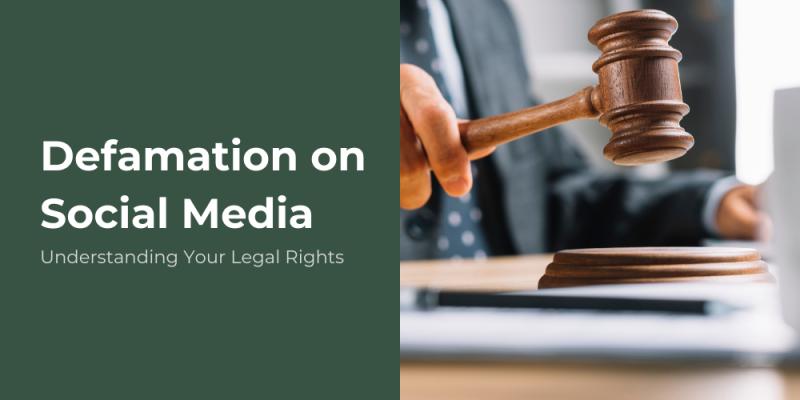Defamation on Social Media: Understanding Your Legal Rights

Understanding defamation on social media is crucial in
today's digital age, where information spreads rapidly and can have significant
consequences for individuals and organizations alike. As social media platforms
continue to dominate communication, the legal implications surrounding
defamation have become increasingly relevant. This blog explores the nuances of
defamation on social media, the legal rights individuals have, and how to
navigate this complex landscape.
What is Defamation?
Defamation occurs when false statements are made about an
individual or organization that damage their reputation. It can be classified
into two categories: libel (written defamation) and slander (spoken
defamation). On social media, most cases fall under libel, as posts, tweets,
and comments are permanent and can be widely disseminated.
The Role of Social Media in Defamation
Social media platforms such as Facebook, Twitter, and
Instagram have transformed how information is shared. While these platforms
facilitate communication and connection, they also provide fertile ground for
defamatory statements. The speed at which information can be shared means that
false claims can spread quickly, often before the affected party can respond.
This rapid dissemination poses unique challenges for individuals seeking to
protect their reputations.
Legal Framework for Defamation on Social Media
In many jurisdictions, defamation laws apply equally to
statements made on social media as they do to traditional media. For instance,
in the United States, the Defamation Act requires a claimant
to prove that the statement was published, that it was false, and that it
caused harm. In India, the Indian Penal Code sections 499 and
500 govern defamation, emphasizing the need for truth as a defense against
defamation claims.
Key Legal Considerations
- Publication
Requirement: The statement must be communicated to someone other than
the claimant. This is easily met on social media, where posts can be
shared and retweeted.
- Falsity:
The claimant must prove that the statement is false. Truth is a complete
defense against defamation.
- Harm:
The claimant must demonstrate that the statement caused harm to their
reputation, which can be challenging in the context of social media where
the impact can be subjective.
- Public
Figures vs. Private Individuals: Public figures often face a higher
burden of proof, needing to show that the statement was made with
"actual malice"—that is, with knowledge of its falsity or
reckless disregard for the truth.
Notable Cases of Social Media Defamation
Several high-profile cases have highlighted the complexities
of defamation on social media:
- Tata
Sons v. Cyrus Mistry: This case involved mutual defamation claims
between corporate entities on social media, showcasing the challenges of
defamation in the corporate world.
- Stocker
v. Stocker: In this case, the court had to consider the context of a
Facebook post and how it would be perceived by a social media audience,
emphasizing the need for courts to adapt traditional defamation principles
to the digital age.
These cases illustrate the evolving nature of defamation law
as it applies to social media, requiring courts to consider the unique
characteristics of online communication.
Protecting Yourself Against Defamation
To mitigate the risk of being involved in a defamation case,
individuals should:
- Verify
Information: Always ensure that the information you share is accurate.
Misinformation can lead to unintended defamation claims.
- Understand
Privacy Settings: Familiarize yourself with the privacy settings of
social media platforms to control who can see your posts and comments.
- Consult
Legal Experts: If you believe you have been defamed or are considering
posting sensitive information, it may be wise to consult with a legal
expert specializing in defamation and cyber law.
The Intersection of Defamation and Martech Strategy
As businesses increasingly rely on social media as part of
their martech strategy, understanding the implications of
defamation becomes essential. Companies must not only engage with their
audience but also protect their brand reputation. This involves monitoring
social media for potential defamatory content and having a response strategy in
place.
Conclusion
Defamation on social media presents unique challenges that
require a nuanced understanding of the law and the dynamics of online
communication. As social media continues to evolve, so too will the legal
landscape surrounding defamation. By being informed and cautious, individuals
and organizations can navigate this complex environment and protect their
reputations effectively.In summary, while social media offers incredible
opportunities for connection and expression, it also necessitates a careful
approach to communication. By fostering responsible online behavior and
understanding legal rights, users can contribute to a safer digital environment
and mitigate the risks associated with defamation.








Comments